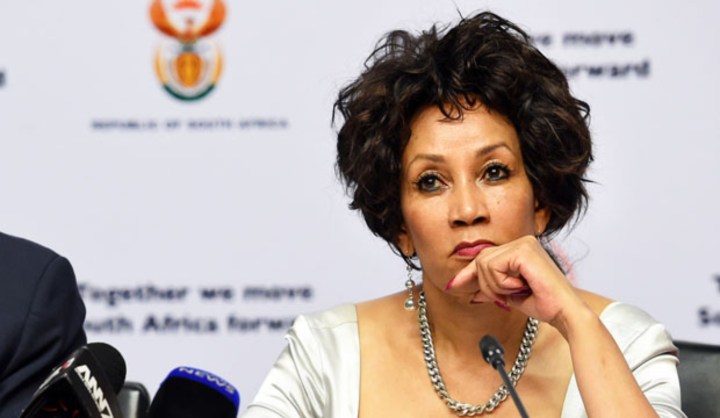South Africa
ANC Policy Conference: ANC rejects decriminalising sex work, endorses free sanitary pads

Delegates at the ANC’s national policy conference rejected a call to decriminalise sex work, the party’s social transformation committee said on Wednesday. Gender issues were a focus of the commission’s work, but the proposals are a long way from implementation. By GREG NICOLSON.
Delegates from the Gauteng ANC caused controversy at the party’s national policy conference this week when they pushed for the decriminalisation of sex work to be included in the party’s social transformation document, which will be up for debate and could become ANC policy at the party’s December conference.
“Gauteng feels we are unduly harsh on people who are trying to make a living,” said Lindiwe Sisulu, head of the ANC NEC subcommittee on social development. “The proposal is that we criminalise what the men do as opposed to what the women do.”
Gender activists and organisations representing sex workers have long campaigned for decriminalisation but their proposals have found little favour with the ANC government.
“This one was sprung on us without going through the necessary process of consultation,” said Sisulu. She said the Gauteng ANC had pushed the issue in the social transformation plenary but it was not raised during commission discussions or in the discussion document released before the conference.
A South African Law Reform Commission report released by the justice minister recently said either sex work could remain totally criminalised or be partially criminalised, with charges against clients but not workers themselves. The report took almost 20 years to complete, a symbol of government’s lack of willingness to act on the issue.
Marlise Richter, policy development and advocacy manager at Sonke Gender Justice, said the ANC Gauteng had consistently supported decriminalisation. “It’s disappointing because international public health evidence shows decriminalisation is the best option to safeguard public health and respect the human rights of sex workers,” she said on the ANC’s decision to reject Gauteng’s call.
The ANC Gauteng was effectively calling for partial criminalisation, allowing for clients to be charged but not sex workers. The model has been criticised as ineffective as it can lead to further vulnerabilities and stigma as sex workers to go to lengths to protect their clients, such as meeting at distant locations. Activists in South Africa have called for full decriminalisation.
It was one of a number of gender issue to come up during the social transformation commission discussions. The party endorsed the proposal of providing free sanitary towels to students, starting in indigent schools. “We have agreed that sanitary towels for people at school should be free,” said Sisulu.
Numerous campaigns have been launched to provide free sanitary towels in schools to prevent poor students from missing classes. While a unified roll-out of the policy has been slow, activists have called on government to distribute sanitary towels as it does with free condoms and the issue has been backed by party leaders.
In 2011, President Jacob Zuma promised government would make free sanitary towels available in schools but by 2016 implementation had fallen far short of the goal.
Buti Manamela, who chaired the social development commission, said government-provided sanitary products shouldn’t be compared to the provision of condoms.
“I think the feeling is we should stop comparing the two,” said Manamela. “I think the comparison of ‘you’re providing condoms but you’re not providing sanitary towels’ is not a justified comparison. The two should not be regarded as equal.”
A key emphasis of the discussions, said Sisulu, was on how to prevent violence against women and children. They resolved to establish safe houses for women exposed to violence, which would be called “houses for survivors”, with social workers to provide support.
Manamela said the survivor houses could expand on and work with the lauded Thuthuzela Care Centres, which have been established to support victims of sexual offences and work in conjunction with the sexual offences courts. The commission also proposed minimum sentences for crimes against women of 15 to 20 years.
“We have resolved that as the ANC we’ve got to work out village and street committees. We know where we have girl children that might be vulnerable and we’re going to launch a campaigns to know your neighbour,” said Sisulu.
Magistrate Courts include provision for children’s courts, but the commission this week decided separate, specialised children’s courts should be established across the country to reduce secondary trauma victims could be exposed to during a trial. “We’d like to urge the justice sector that violence against children cases are prioritised,” said Sisulu.
The recommendations from the commission will now be discussed by ANC branches before going to the party’s December conference where they could be adopted. Even if they are adopted, the ANC government would still have to find money to fund the proposals, which in the case of establishing new courts or, as one recommendation suggested, raising cut off for the child care grant for child-headed households from 18 to 21 years old, could be difficult.
Sisulu said the social issues were at the heart of the ANC’s agenda, but there is reason for scepticism. The ANC Women’s League reportedly included men in its delegation to the conference because, according to its leader, women sometimes lose debates because they become emotional. “We were not dealing with delegations… We were dealing with the social transformation committee,” said Sisulu on the scandal. DM
Photo: Minister of Human Settlements Lindiwe Sisulu during the Social Protection, Community and Human Development Cluster media briefing on February 15, 2015. (Photo: DoC)


















 Become an Insider
Become an Insider